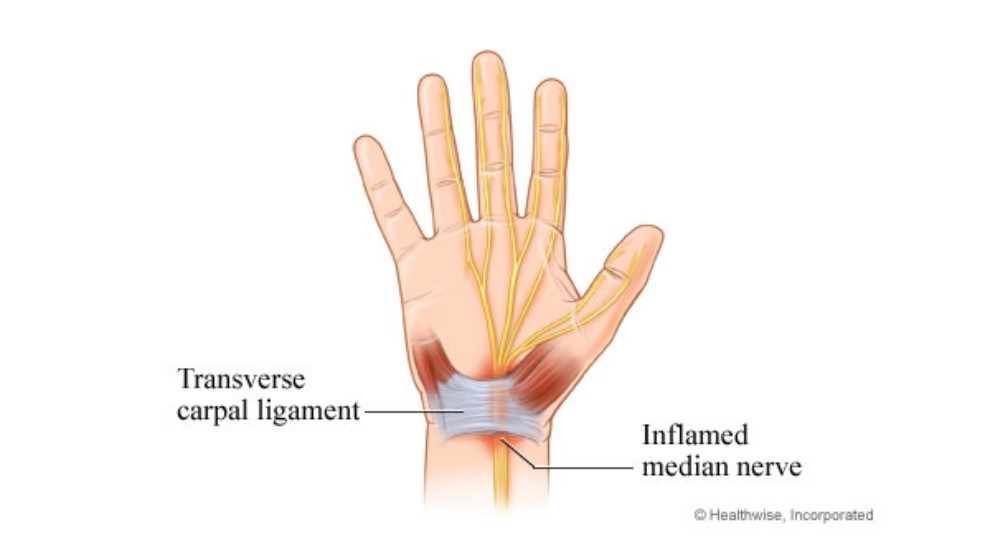One to five percent of all adults will experience carpal tunnel syndrome in their lifetimes. It is more common in women than men. At NewYork-Presbyterian, our highly experienced orthopedists offer a full range of care for carpal tunnel syndrome, including nonsurgical and surgical options, to help you achieve the best possible outcome.
What is Carpal Tunnel Syndrome?
Carpal tunnel syndrome is a common source of numbness, pain, and other uncomfortable symptoms in the hand and arm. The carpal tunnel is a narrow, tunnel-like structure in the wrist. When the median nerve, a nerve that travels from the arm to the hand through the carpal tunnel, gets compressed, carpal tunnel syndrome can occur.

Signs & Symptoms of Carpal Tunnel Syndrome
Carpal tunnel syndrome symptoms usually arise gradually and affect the hand's thumb and first three fingers.
These symptoms, which may initially be most noticeable at night, can include:
- Tingling
- Numbness
- Sensation of swelling in the fingers
- Muscle damage and weakness
- Difficulty performing tasks that require fine motor skills
- In some cases, arm pain between the elbow and hand
What Causes Carpal Tunnel Syndrome?
In most cases of carpal tunnel syndrome, there is no single cause. Many factors can contribute to the development of carpal tunnel syndrome, including:
- Heredity can be an important factor. Carpal tunnels are smaller in some people, and this trait can run in families.
- Hand use over time can play a role
- Hormonal changes related to pregnancy can play a role
- Age is a factor, as the disease occurs more frequently in older people
- Medical conditions, including diabetes, rheumatoid arthritis, and thyroid gland imbalance, can play a role
Risk Factors for Carpal Tunnel Syndrome
Risk factors for carpal tunnel syndrome include the following conditions and behaviors:
- Repetitive motion, such as working at a keyboard (use of a mouse may also be a factor), especially if the wrist is bent downward; driving, or work that involves grasping and exerting pressure with the hands
- Pregnancy and menopause, due to fluid retention that increases pressure in the carpal tunnel; carpal tunnel syndrome associated with pregnancy goes away when the woman is no longer pregnant
- Illnesses that directly affect the nerves and/or the lining around the tendons in the wrist, including hypothyroidism, diabetes and rheumatoid arthritis, kidney failure, and lymphedema
- Gender; women tend to have naturally smaller carpal tunnels
- Injury to the wrist, such as a fracture
- Obesity
- Genetics
- Alcohol use
- Older age
- Taking certain medications (this link is still being explored by researchers)
Prevention
Preventing carpal tunnel syndrome may be possible by minimizing stress on the hands and wrists. Prevention guidelines include:
- Adapting your position to avoid bending the wrists when performing repetitive actions
- Placing less stress on the hands and wrists by maintaining a lighter touch on a keyboard or other equipment used routinely throughout the day
- Taking frequent breaks from work activities to incorporate gentle stretching exercises
- Using a wrist brace during sleep if you have a tendency to bend your wrists
- Following your doctor's recommendations for treatment of conditions associated with carpal tunnel syndrome, such as diabetes or rheumatoid arthritis
- Checking your posture frequently; hunching over while working can put stress on other parts of the body, including the hands and wrists
- If these preventative measures do not work, seek the advice of a trained hand surgeon
Trust NewYork-Presbyterian for Carpal Tunnel Syndrome Care
If you’re experiencing signs and symptoms of carpal tunnel syndrome, NewYork-Presbyterian's team of orthopedic specialists can help. Our patient-centered approach ensures that every treatment option is explored to provide the best outcome possible. Call us today to schedule an appointment.



